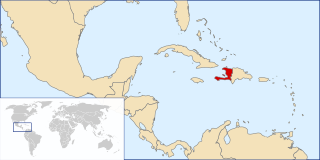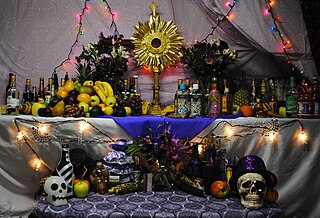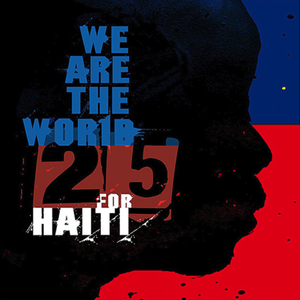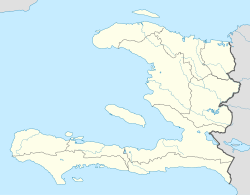
The Dominican Republic is a country located on the island of Hispaniola in the Greater Antilles archipelago of the Caribbean region. It occupies the eastern five-eighths of the island, which it shares with Haiti, making Hispaniola one of only two Caribbean islands, along with Saint Martin, that are shared by two sovereign states. The Dominican Republic is the second-largest nation in the Antilles by area at 48,671 square kilometers (18,792 sq mi), and third by population with approximately 10.5 million people, of whom approximately 3.3 million live in the metropolitan area of Santo Domingo, the capital city. The official language of the country is Spanish.

Haiti, officially the Republic of Haiti formerly founded as Hayti, is a country located on the island of Hispaniola in the Greater Antilles archipelago of the Caribbean Sea, to the east of Cuba and Jamaica and south of The Bahamas and the Turks and Caicos Islands. It occupies the western three-eighths of the island which it shares with the Dominican Republic. To its south-west lies the small island of Navassa Island, which is claimed by Haiti but is disputed as a United States territory under federal administration. Haiti is 27,750 square kilometers (10,714 sq mi) in size and has an estimated population of 11.1 million, making it the most populous country in the Caribbean Community (CARICOM) and the second-most populous country in the Caribbean after Cuba.

The recorded history of Haiti began on 5 December 1492, when the European navigator Christopher Columbus happened upon a large island in the region of the western Atlantic Ocean that later came to be known as the Caribbean. It was inhabited by the Taíno and Arawakan people, who variously called their island Ayiti, Bohio, and Kiskeya(Quisqueya). Columbus promptly claimed the island for the Spanish Crown, naming it La Isla Española, later Latinized to Hispaniola. French influence began in 1625, and French control of what was called Saint-Domingue in modern-day Haiti began in 1660. From 1697 on, the western part of the island was French, and the eastern part was Spanish. Haiti became one of the wealthiest of France's colonies, producing vast quantities of sugar and coffee, depending on kidnapped Africans to provide the labor. Inspired by the message of the French Revolution, the enslaved Haitians rose up in revolt in 1791, and after decades of struggle, the independent republic of Haiti was officially proclaimed in 1804.

Hispaniola is an island in the Caribbean archipelago known as the Greater Antilles. It is the most populous island in the West Indies and the region's second largest after Cuba.

Port-au-Prince is the capital and most populous city of Haiti. The city's population was estimated at 987,310 in 2015 with the metropolitan area estimated at a population of 2,618,894. The metropolitan area is defined by the IHSI as including the communes of Port-au-Prince, Delmas, Cite Soleil, Tabarre, Carrefour, and Pétion-Ville.

Jean-Bertrand Aristide is a former Haitian priest and politician who became Haiti's first democratically elected president. A proponent of liberation theology, Aristide was appointed to a Roman Catholic parish in Port-au-Prince in 1982 after completing his studies to become a priest of the Salesian order. He became a focal point for the pro-democracy movement first under Jean-Claude "Baby Doc" Duvalier and then under the military transition regime which followed. He won the Haitian general election between 1990 and 1991, with 67% of the vote.. As a priest, he taught liberation theology and, as a president, he attempted to normalize Afro-Creole culture, including Vodou religion, in Haiti. President Aristide was briefly president of Haiti, until a September 1991 military coup. The coup regime collapsed in 1994 under U.S. pressure and threat of force. Aristide was then president again from 1994 to 1996 and from 2001 to 2004. However, Aristide was ousted in the 2004 coup d'état after right-wing ex-army paramilitaries invaded the country from across the Dominican border. Aristide and many others have observed the role of the United States in orchestrating the coup against him. Aristide was later forced into exile in the Central African Republic and South Africa. He finally returned to Haiti in 2011 after seven years in exile.

Jean-Claude Duvalier, nicknamed "Baby Doc", was a Haitian politician who was the President of Haiti from 1971 until he was overthrown by a popular uprising in 1986. He succeeded his father François "Papa Doc" Duvalier as the ruler of Haiti after his death in 1971. After assuming power, he introduced cosmetic changes to his father's regime and delegated much authority to his advisors. Thousands of Haitians were killed or tortured, and hundreds of thousands fled the country during his presidency. He maintained a notoriously lavish lifestyle while poverty among his people remained the most widespread of any country in the Western Hemisphere.

Nel Ust Wyclef Jean is a Haitian-American rapper, musician and actor. At the age of nine, Jean immigrated to the United States with his family. He first achieved fame as a member of the New Jersey hip hop group the Fugees. Jean has won three Grammy Awards for his musical work.

Cap-Haïtien, often referred to as Le Cap or Au Cap, is a commune of about 190,000 people on the north coast of Haiti and capital of the department of Nord. Previously named Cap‑Français and Cap‑Henri, it was historically nicknamed the Paris of the Antilles, because of its wealth and sophistication, expressed through its architecture and artistic life. It was an important city during the colonial period, serving as the capital of the French Colony of Saint-Domingue from the city's formal foundation in 1711 until 1770 when the capital was moved to Port-au-Prince. After the Haitian Revolution, it became the capital of the Kingdom of Northern Haiti under King Henri Christophe until 1820.

Haitian Creole is a French-based creole language spoken by 10–12 million people worldwide, and the only language of most Haitians. It is called kreyòl ayisyen or just kreyòl by its speakers, and créole haïtien in Standard French.

The United States occupation of Haiti began on July 28, 1915, when 330 US Marines landed at Port-au-Prince, Haiti, on the authority of US President Woodrow Wilson. The first invasion forces had already disembarked from USS Montana on January 27, 1914. The July intervention took place following the murder of dictator President Vilbrun Guillaume Sam by insurgents angered by his political murders of elite opposition.

The president of Haiti, officially called the president of the Republic of Haiti is the head of state of Haiti. Executive power in Haiti is divided between the president and the government headed by the Prime Minister of Haiti. The current president is Jovenel Moïse, who took office on February 7, 2017.

The Haitian Revolution was a successful insurrection by self-liberated slaves against French colonial rule in Saint-Domingue, now the sovereign state of Haiti. The revolt began on 22 August 1791, and ended in 1804 with the former colony's independence. It involved blacks, mulattoes, French, Spanish, and British participants—with the ex-slave Toussaint Louverture emerging as Haiti's most charismatic hero. The revolution was the only slave uprising that led to the founding of a state which was both free from slavery, and ruled by non-whites and former captives. It is now widely seen as a defining moment in the history of the Atlantic World.
The Haiti national football team represents Haiti in international football. Haiti is administered by the Fédération Haïtienne de Football (FHF), the governing body for football in Haiti. They have been a member of FIFA since 1934, a member of CONCACAF since 1961 and a member of the Caribbean Football Union (CFU) since 1978. Haiti's home ground is Stade Sylvio Cator in Port-au-Prince and their head coach was Patrice Neveu, until December 2016.

Haitian Americans are Americans of Haitian origin. The largest proportion of Haitians in the United States live in the South Florida area. In addition, they have settled in major Northeast cities such as New York City, Boston, Philadelphia and Washington, D.C. and in Chicago in the Midwest. Most are immigrants or their descendants from the mid-late 20th-century migrations to the United States. Haitian Americans represent the largest group within the Haitian diaspora.

Haitian Vodou is an African diasporic religion that developed in Haiti between the 16th and 19th centuries. It arose through a process of syncretism between the traditional religions of West Africa and Roman Catholicism. Adherents are known as Vodouists or "servants of the spirits".

Haiti has a sizable diaspora, present chiefly in the Dominican Republic, the United States, Canada, Cuba, the Bahamas, and France. They also live in other countries like Belgium, Jamaica, Turks and Caicos, Mexico, U.S. Virgin Islands, Brazil and Chile, among others.

The 2010 Haiti earthquake was a catastrophic magnitude 7.0 Mw earthquake, with an epicenter near the town of Léogâne (Ouest) and approximately 25 kilometres (16 mi) west of Port-au-Prince, Haiti's capital. The earthquake occurred at 16:53 local time on Tuesday, 12 January 2010.

"We Are the World 25 for Haiti" is a charity single recorded by the supergroup Artists for Haiti in 2010. It is a remake of the 1985 hit song "We Are the World", which was written by American musicians Michael Jackson and Lionel Richie, and was recorded by USA for Africa to benefit famine relief in Africa. Initially, in late 2009, it had been suggested to Richie and Quincy Jones—producer of the original "We Are the World"—that a re-cut version of the song be re-released under the title "Live 25". Following the magnitude 7.0 Mw earthquake in Haiti, which devastated the area and killed thousands of people, it was agreed that the song would be re-recorded by new artists, in the hope that it would reach a new generation and help benefit the people of Haiti.

The COVID-19 pandemic in Haiti is part of the worldwide pandemic of coronavirus disease 2019 caused by severe acute respiratory syndrome coronavirus 2. The virus was confirmed to have reached Haiti in March 2020. The index case was in Port-au-Prince. As of 28 July 2020, there are 7,340 total confirmed cases, 2,817 active cases, 17,748 suspected cases, with 158 deaths and 4,365 recoveries.


















